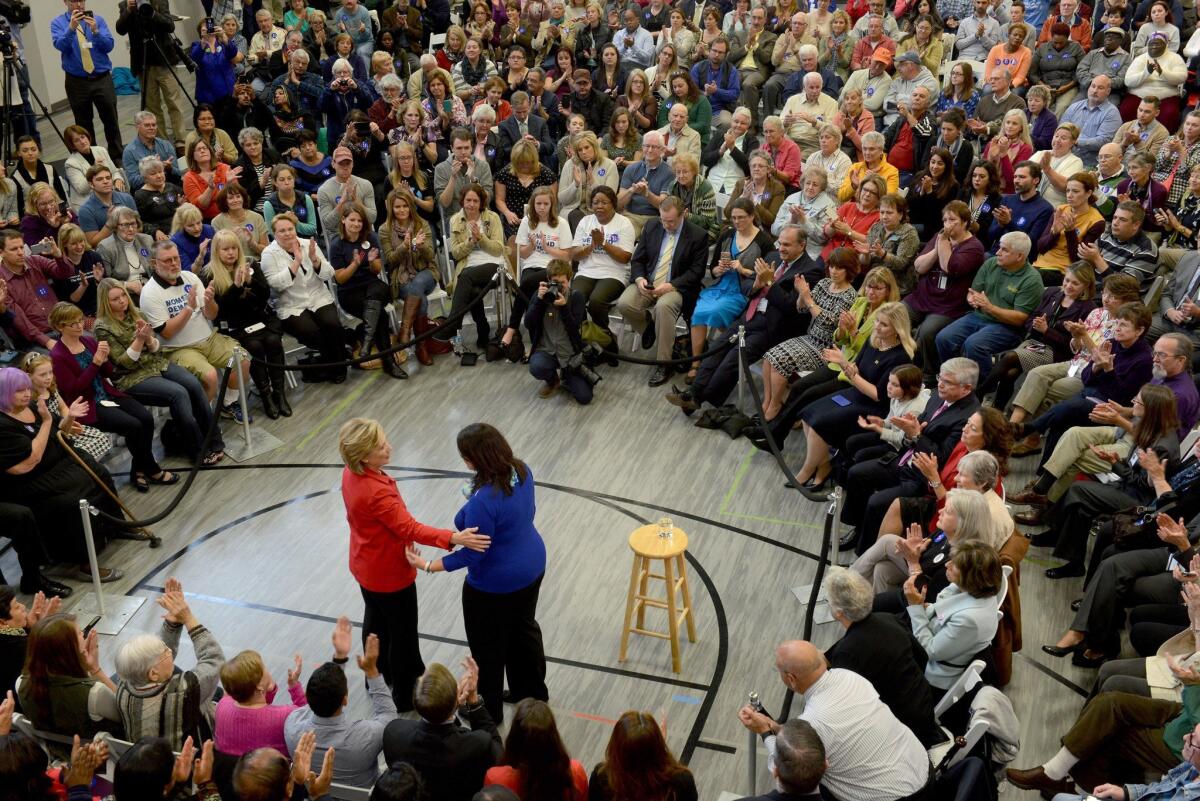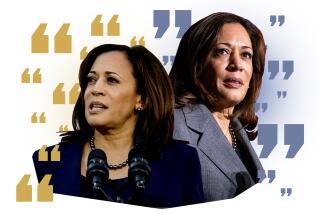Column: Can Hillary Clinton change the gun debate?

Presidential candidate Hillary Clinton reaches out to Nicole Hockley, whose child was killed at Sandy Hook Elementary School, during a town hall event in Manchester, N.H. on Oct. 5.
- Share via
Hillary Rodham Clinton proposed a list of tough new gun control measures this week, seeking to channel public outrage after yet another mass murder on a school campus. Her package was ambitious, even bold, but it’s not likely to go anywhere even if she’s elected president, which tells us something about the state of gun control politics in America.
Clinton proposed new laws to make background checks on gun buyers nearly universal and repeal a rule that allows a sale to proceed if the background check isn’t complete within three days. She said she would revive the defunct ban on military-style assault weapons and repeal a law that bars victims of gun violence from suing gun manufacturers.
At a town meeting in New Hampshire on Monday, her voice cracked as she introduced the mother of a 6-year-old boy who died in the 2012 massacre at Sandy Hook Elementary School in Connecticut. “How much longer can we just shrug?” Clinton demanded.
She was tougher than most Democratic candidates in past presidential campaigns, including the Hillary Rodham Clinton who ran in 2008. Back then, Clinton supported background checks and the assault-weapons ban, but the issue wasn’t a big part of her campaign. Indeed, after then-Sen. Barack Obama dismissed rural voters as “clinging to guns or religion,” she defended gun ownership as part of the American way of life.
This time, though, Clinton has embraced gun control as one of the central messages of her campaign. We’re unlikely to see her hunting ducks, as nominee John F. Kerry did in 2004, or even shooting skeet, as President Obama did in 2013.
Clinton’s new focus on gun control is, in part, a gambit to make sure progressive voters notice that her main opponent, Sen. Bernie Sanders, has a complicated record on the issue. Sanders, who represents the gun-friendly state of Vermont, supports background checks and the assault-weapons ban, too, but unlike Clinton, he voted in 2005 to pass the liability exemption bill for manufacturers.
Beyond short-term tactics, Clinton’s militancy also illustrates that gun control is no longer a political third rail for Democrats.
In the primaries, the politics are simple: A Pew Poll this year found that 73% of Democrats think it’s more important to control guns than to protect gun rights. Among Republicans, the numbers are almost exactly opposite.
The general election is, of course, more complicated. In 2000, Democratic nominee Al Gore lost Arkansas and Tennessee largely because the National Rifle Assn. painted him as too tough on guns (at least according to Bill Clinton).
But here’s the thing: Democratic presidential candidates have virtually given up trying to win those increasingly red states. Instead of courting hard-to-get white working-class voters in rural areas and exurbs, President Obama won the last two elections by mobilizing a coalition of city-dwellers, women, young people and minorities, and Clinton appears to be following his path.
“There’s no question that the politics of gun control have changed since Bill Clinton,” said Matt Bennett of the centrist Democratic group Third Way, who has worked on gun control legislation.
“Unlike earlier Democrats, Clinton doesn’t have to worry that these proposals are going to hurt her. She still has to compete in Pennsylvania, Ohio and the upper Midwest, where guns are important,” he said. “But those states have changed too. She can win there even if the NRA campaigns against her.”
Still, if Clinton’s gun control package won’t block her path to the White House, that doesn’t mean she’ll achieve meaningful reform once in office. Seven of her nine proposals would require Congress to pass new laws, and with a Republican majority, that’s not going to happen.
In 2013, after Sandy Hook, a bipartisan effort to pass serious gun control measures collapsed in Congress — even though, at the time, the Senate had a Democratic majority.
“If Sandy Hook didn’t do it, nothing will,” Bennett said.
A hostile legislature could also hamstring the measures that Clinton wants to enact by executive order. Congress has the power of the purse; it can – and does- block funding for even modest gun control initiatives. As things stand, the Bureau of Alcohol, Tobacco, Firearms and Explosives doesn’t have enough staff to enforce existing rules, let alone new ones.
“They’re able to inspect federally licensed dealers, on average, only once every seven years,” Bennett told me.
No, Clinton’s election wouldn’t guarantee a shift in firearms policy.
“This will not change until the politics changes and the behavior of elected officials changes,” Obama said last week. “The people who are troubled by this have to be as intense and as organized and as adamant about the issue as the folks on the other side…. You just have to, for a while, be a single-issue voter because that’s what is happening on the other side.”
He’s right. But that’s a very long road.
Twitter: @DoyleMcManus
Follow the Opinion section on Twitter @latimesopinion and Facebook
More to Read
A cure for the common opinion
Get thought-provoking perspectives with our weekly newsletter.
You may occasionally receive promotional content from the Los Angeles Times.









